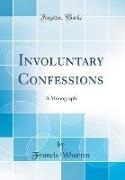Read more
Excerpt from Involuntary Confessions: A Monograph
This con¿ict between the true and false arises in all cases where guilt is attempted to be screened by human contrivance. The mind involuntarily becomes its own prosecutor. It drops at each point evidence to prove its guilt. Each statement that it makes - each subterfuge to which it resorts each pretext it suggests - is a witness that it prepares and qualifies for admis sion on trial. In this, and in the universality of the psychological truth that guilt cannot keep its counsel, we may find an attribute of divine justice by which crime is made involuntarily its own avenger. Man cannot conceal the topic of a great crime, either anticipated or committed. It sometimes leaps out of him convulsively in dreams; sometimes a false cunning leads him to talk about it to know what suspicions may be a¿oat; sometimes that sort of madness which impels people to dash themselves from a high tower, forces him to the disclosure. Even his silence tells against him; and when it does not, the tremor of the body supplies the place of the tremor of the mind. Nor can he keep peace with his associates. There is a disruptive power in a consciousness of common guilt, which produces a hatred so demonstrative, that if it does not supply the proof, it attracts the suspicion of a great wrong having been done.
About the Publisher
Forgotten Books publishes hundreds of thousands of rare and classic books. Find more at www.forgottenbooks.com
This book is a reproduction of an important historical work. Forgotten Books uses state-of-the-art technology to digitally reconstruct the work, preserving the original format whilst repairing imperfections present in the aged copy. In rare cases, an imperfection in the original, such as a blemish or missing page, may be replicated in our edition. We do, however, repair the vast majority of imperfections successfully; any imperfections that remain are intentionally left to preserve the state of such historical works.

